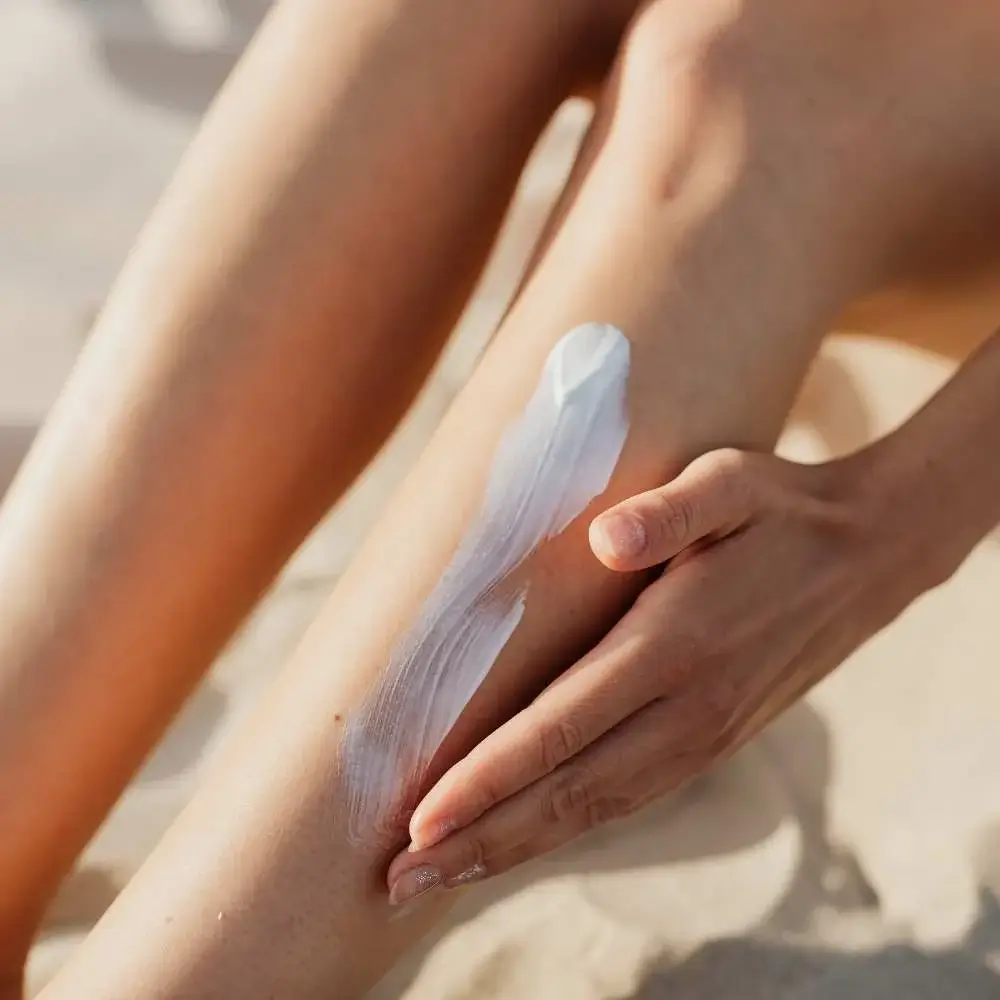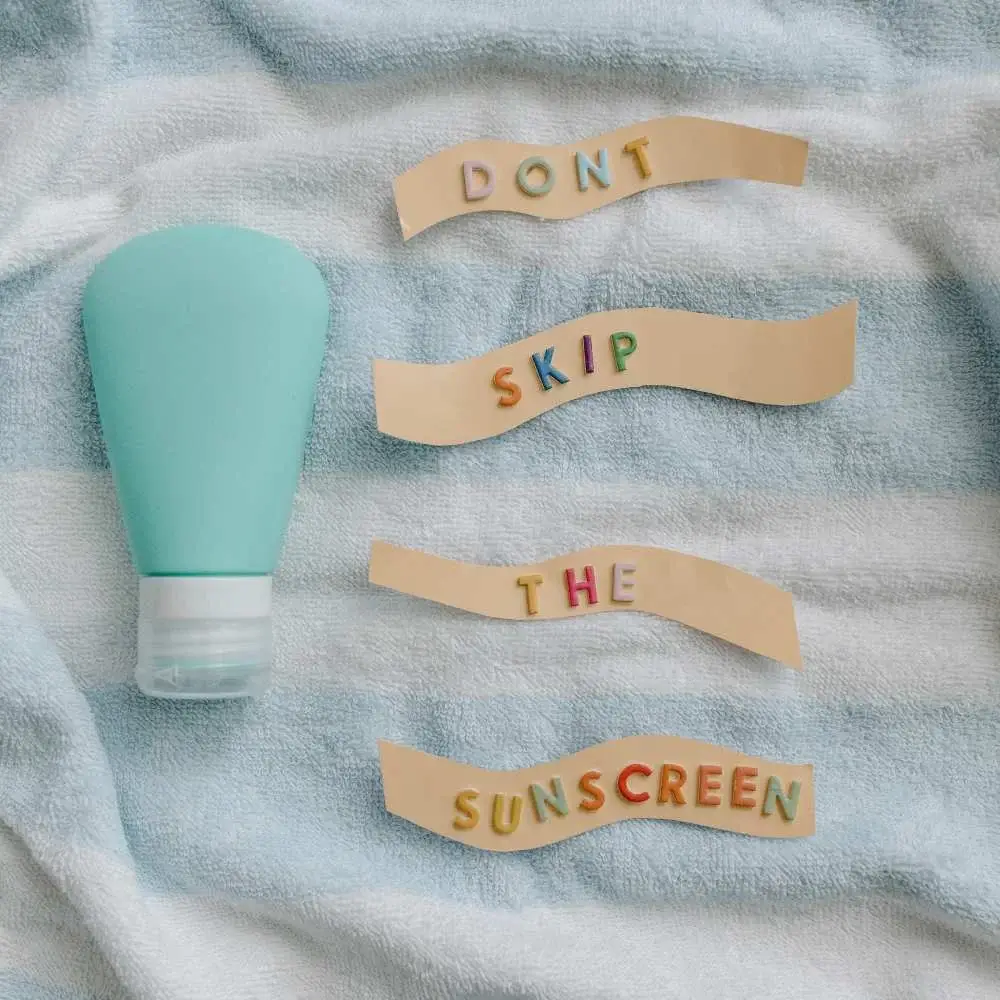Raise your hand if you've ever felt personally victimized by the sun's relentless rays. We've all been there - one minute you're basking in the glorious sunshine, and the next, you're a walking, talking lobster. This is where sunscreen, our unsung hero, comes swooping in to save the day. In this article, we'll dive into the world of sunscreen, exploring its importance, how it works, and why it should be a non-negotiable part of your daily routine. Stick around if you want to avoid turning into a human tomato this summer!

Let's Talk About Sunscreen
Oh, sunscreen! It's that magical potion that holds the power to shield us from the sun's harsh rays. But is it really as important as we've been led to believe? Absolutely, and here's why.
Understanding the Sun’s Rays
First, let's get to know our enemy a little better. The sun emits two types of harmful rays: UVA and UVB. UVA rays are the sneaky ones. They slip through your windows, penetrate deep into your skin, and cause premature aging. UVB rays, on the other hand, are the notorious culprits behind painful sunburns and skin cancer.
The Role of Sunscreen
This is where sunscreen steps in like a superhero. Sunscreen contains ingredients that either absorb, scatter, or reflect these harmful rays, protecting your skin from damage. Essentially, it's like a bulletproof vest for your skin, and who wouldn't want that?
Sunscreen and Skin Health
What does this mean for your skin health? Well, regular use of sunscreen can prevent signs of premature aging like wrinkles and age spots. More importantly, it significantly reduces your risk of developing skin cancer, which is the most common form of cancer in many countries.
The Bigger Picture
But the importance of sunscreen goes beyond personal health. Some sunscreens contain ingredients that are harmful to marine life. By choosing reef-safe sunscreens, you're not just protecting yourself but also playing a part in conserving our oceans.
So, whether you're headed to the beach or just running errands, don't forget to put on some sunscreen. Your skin (and the planet) will thank you!
The Bottom Line
Sunscreen isn't just for hot summer days or tropical vacations. It's a daily essential that should be a non-negotiable part of your skincare routine. So, the next time you step out, make sure you're armed with your trusty bottle of sunscreen. After all, it's better to be safe than sorry!
In conclusion, the importance of sunscreen cannot be overstated. It's a powerful tool in our arsenal against the sun's harmful rays, and its benefits are manifold. So, slather on that sunscreen and step into the sun with confidence!

All About Sunscreen: Physical vs. Chemical
Sunscreen, the unsung hero of our skincare routine, is more complex than you might think. It comes in two main types: physical and chemical. But what’s the difference, and which one should you choose? Let's dive in.
Physical Sunscreen: The Old Guard
Physical sunscreen, also known as mineral sunscreen, is like the sturdy, dependable grandfather of sun protection. It uses active minerals, such as zinc oxide and titanium dioxide, to physically block and reflect the sun's rays away from your skin.
The benefits of physical sunscreen are many. It's effective immediately upon application, it's less likely to irritate sensitive skin, and it offers broad-spectrum protection against both UVA and UVB rays. Plus, it's usually more environmentally friendly than its chemical counterpart.
But it's not all sunshine and rainbows. Physical sunscreen can be thicker and harder to rub in, often leaving a white cast on the skin. If you've ever felt like a ghost at the beach, you probably used a physical sunscreen.
Chemical Sunscreen: The Modern Marvel
Enter chemical sunscreen, the sleek, newer kid on the block. Chemical sunscreens work a little differently. Instead of blocking the sun's rays, they absorb them. The active ingredients in chemical sunscreens, such as avobenzone and octinoxate, convert these rays into heat, which is then released from your skin.
Chemical sunscreens are generally easier to apply and blend into the skin seamlessly, making them a favorite for daily use. However, they require about 20 minutes to become effective, can sometimes irritate the skin, and have been linked to coral reef damage. It's a bit of a trade-off.
Choosing Your Sunscreen
So, which sunscreen is the best? The answer is...it depends. Your choice of sunscreen should depend on your skin type, lifestyle, and personal preferences. If you have sensitive skin, a physical sunscreen might be the way to go. If you prefer a lightweight, invisible finish, you might lean towards a chemical sunscreen.
Remember, the most important thing is that you're using sunscreen, period. Whether it's physical or chemical, sunscreen is a vital part of protecting your skin from the harmful effects of the sun.
In the end, understanding the difference between physical and chemical sunscreen helps us make informed decisions about our skin health. So, don’t shy away from that sunscreen bottle – embrace it, because it’s your best friend in the fight against sun damage!

Sunscreen and SPF: What's the Connection?
Sunscreen, our trusty sidekick in the fight against sun damage, often comes with a mysterious abbreviation on its label: SPF. But what does SPF mean, and why is it important? Let's break it down.
SPF: The Basics
SPF stands for Sun Protection Factor. It's a measure of how well a sunscreen can protect your skin from UVB rays—the type of radiation that causes sunburn and contributes to skin cancer.
How Does SPF Work?
Think of SPF like a shield. If you're wearing a sunscreen with an SPF of 30, theoretically, only 1/30th of the sun's UVB rays will reach your skin.
This doesn't mean you can stay out in the sun 30 times longer, though. SPF isn't a time indicator; it's a measure of protection. Even with sunscreen on, some UV rays still get through to your skin, so reapplication is key.
Decoding the Numbers
So, what about the numbers? Does a higher SPF mean better protection? Not necessarily.
Here's the deal: SPF 15 blocks about 93% of UVB rays, SPF 30 blocks 97%, and SPF 50 blocks 98%. As you can see, no sunscreen can block 100% of the sun's rays, and the differences become negligible after SPF 30.
Choosing the Right SPF
So, which SPF should you choose? Most dermatologists recommend using a sunscreen with an SPF of at least 30, which blocks nearly 97% of UVB rays.
However, the best SPF for you depends on several factors, including your skin type, the intensity of the sun, and how long you'll be outdoors.
Remember, while choosing a high SPF sunscreen is important, it's equally crucial to apply it properly and frequently.
To wrap up, SPF is a crucial factor in choosing and using sunscreen. By understanding what SPF means and how it works, we can make smarter choices about sun protection and keep our skin healthy and happy. So, grab your bottle of sunscreen and step into the light, confident in the knowledge you've armed yourself with the best defense against the sun's rays!

The Art of Applying Sunscreen
Sunscreen is a powerful ally in our daily battle against the sun's harmful rays. But like any weapon, it's only as effective as the way we wield it. So, how do we properly apply sunscreen to ensure maximum protection? Let's dive in.
The Golden Rule: Quantity Matters
When it comes to sunscreen, more is more. Dermatologists recommend using about a shot glass worth (or two tablespoons) of sunscreen for your entire body and a nickel-sized dollop for your face. Skimping on sunscreen can leave you exposed to harmful UV rays, so don't be shy—slather it on!
Timing is Everything
Timing is crucial with sunscreen application. Chemical sunscreens need about 20 minutes to absorb into your skin before they can protect you from the sun. So, if you're using a chemical sunscreen, make sure to apply it before you head outdoors.
Physical sunscreens, on the other hand, start working immediately upon application. However, it's still a good idea to apply them ahead of time to ensure you haven't missed any spots.
Don't Forget the Details
Certain areas of the body are often overlooked when applying sunscreen. Don't forget about the tops of your ears, your neck, the back of your hands, and your feet. If you're balding or have thin hair, either apply sunscreen to your scalp or wear a hat.
Reapply, Reapply, Reapply
One application of sunscreen isn't enough for all-day protection. You should reapply sunscreen every two hours, or immediately after swimming or sweating heavily, even if the sunscreen is labeled as water-resistant.
Make it a Routine
Lastly, make sunscreen application a part of your daily routine, not just something you do when you're at the beach or pool. Remember, the sun's rays can reach you even on cloudy days and through car windows.
In conclusion, proper application of sunscreen is key to ensuring it provides the protection promised on the bottle. By following these steps, you can maximize your defense against sun damage and keep your skin looking young and healthy. So next time you reach for your sunscreen, remember these tips and apply like a pro!

Unveiling the Truth: Debunking Common Myths About Sunscreen
Sunscreen, our skin's formidable defender against the sun's harmful rays, is surrounded by a surprising amount of misinformation. Let's tackle some of these common myths head-on and set the record straight.
Myth 1: Sunscreen Isn't Necessary on Cloudy Days
Contrary to popular belief, up to 80% of the sun's harmful UV rays can penetrate cloud cover. So even on an overcast day, sunscreen is essential to protect your skin from damage. Remember, it's not the heat of the sun that causes skin damage, but its UV rays.
Myth 2: You Don't Need Sunscreen if You Have Dark Skin
While it's true that melanin provides some natural protection against the sun's rays, it's not enough to prevent skin damage entirely. People of all skin tones can get sunburned and develop skin cancer, so everyone should wear sunscreen.
Myth 3: A High SPF Means You Don't Need to Reapply
A higher SPF does provide more protection against UVB rays, but no sunscreen can block 100% of the sun's rays. Plus, sunscreen can wear off due to sweat, swimming, or simply the passage of time. Regardless of the SPF, you need to reapply sunscreen every two hours for continuous protection.
Myth 4: If You're Wearing Makeup with SPF, You Don't Need Sunscreen
While makeup with SPF can provide some protection, it's usually not enough on its own. Most people don't apply enough makeup to get the full SPF protection listed on the label. For the best protection, use sunscreen under your makeup.
Myth 5: Sunscreen Causes Vitamin D Deficiency
While sunscreen does block UVB rays, which help our bodies produce vitamin D, studies have shown that wearing sunscreen doesn't lead to vitamin D deficiency. You can still get plenty of vitamin D while protecting your skin with sunscreen.
In conclusion, understanding the facts about sunscreen can help us use it more effectively and protect our skin from the sun's damaging effects. So, the next time you hear one of these myths, you'll know the truth and can spread the word about the importance of sunscreen.

Finding Your Match: Choosing the Right Sunscreen for Your Skin Type
Sunscreen is not a one-size-fits-all product. Just like other skincare products, the sunscreen you choose should cater to your particular skin type. But how do you find the right sunscreen for you? Let's explore.
Sunscreen for Dry Skin
If your skin tends to be dry, look for sunscreens that double as moisturizers. Many sunscreens contain hydrating ingredients like glycerin, oils, and aloe, which can help keep your skin soft and smooth while protecting it from the sun. Cream or lotion formulations are usually the best bet for dry skin.
Sunscreen for Oily Skin
For those with oily or acne-prone skin, the thought of applying a greasy sunscreen might seem daunting. Fear not! Look for sunscreens labeled "non-comedogenic", meaning they won't clog your pores. Gel formulas and sunscreens with a matte finish can also help control shine.
Sunscreen for Sensitive Skin
Sensitive skin needs gentle care, and sunscreen is no exception. If your skin reacts easily, opt for a physical or mineral sunscreen, which sits on top of the skin rather than absorbing into it and is less likely to cause irritation. Also, look for sunscreens that are fragrance-free and hypoallergenic.
Sunscreen for Aging Skin
If you're concerned about signs of aging, sunscreen is your best friend. But some sunscreens can do double duty by protecting your skin from the sun while also providing anti-aging benefits. Look for sunscreens that contain antioxidants, such as vitamins C and E, which can help fight free radicals that contribute to aging.
Sunscreen for Dark Skin
While darker skin does have more natural protection against the sun compared to lighter skin, it can still get sunburned and develop skin cancer. People with dark skin should use a broad-spectrum sunscreen with an SPF of 30 or higher. And since physical sunscreens can leave a white cast, a chemical sunscreen might be a better option.
Choosing the right sunscreen for your skin type can make a big difference in both its effectiveness and how it feels on your skin. Remember, the best sunscreen is the one you'll wear every day, so find a formula you love and make it a staple in your skincare routine. Your future self will thank you!

Your Comprehensive Sunscreen FAQ Guide
Whoop, whoop! Summer's knocking on our doors, folks! It's time to whip out those flip-flops, beach towels, and most importantly, your trusty ol' sunscreen. But wait a minute, do you really know your sunscreen as well as you think? Like, what makes it the superhero of sun safety? Or how often it needs a re-up during your beach day? And the million-dollar question - can you still get that sun-kissed glow while wearing it? Buckle up, sun-lovers! We're about to take a fun ride into the world of sunscreen and spill the tea on all these burning questions. Let's get started, shall we?
Is it safe to use sunscreen every day?
The answer my friends, is a big, capital YES! Sunscreen isn't just for beach days or summer hikes. It's like the best kind of friend - there for you through thick and thin, rain or shine. Even on cloudy days, those sneaky UV rays are still out and about, ready to crash your skin party. So, make sunscreen a part of your daily skincare routine, just like brushing your teeth or combing your hair. And remember, no skimping! Make sure to apply enough to cover all your exposed skin. So, are you ready to become best buds with your sunscreen? Your skin will thank you!
How Does Sunscreen Work?
Alright, sun worshippers, gather 'round! Let's talk about how our trusty sidekick, sunscreen, works its magic. Imagine sunscreen as the coolest bouncer you've ever met. It stands guard on your skin, ready to protect you from those party-crashing UV rays. The minute these harmful rays try to sneak in, sunscreen bounces them right off your skin. That's all thanks to the special ingredients it has, like minerals and chemicals that absorb, scatter, or reflect UV light. So, when you slather on that sunscreen, you're basically putting up a "No Entry" sign for UV rays. Pretty cool, huh? Remember though, even the best bouncers need a break. So, reapply your sunscreen every two hours to keep the protection going strong! Now, who's ready for some safe fun in the sun?
How Often Should You Apply Sunscreen?
If you're shouting "Once a day is enough!" at your screen, well, I hate to break it to you, but that's a big ol' nope. Picture sunscreen as an ice cream on a hot summer day - it melts away with time and needs constant re-ups. So, here's the golden rule: Apply your sunscreen generously every two hours. And if you're taking a dip in the pool or working up a sweat playing beach volleyball, reapply right after. Think of it as your skin's thirst for protection. Keep it hydrated with sunscreen and it'll thank you by looking fabulous. Now, who's ready to make sunscreen their summer BFF?
Can You Tan with Sunscreen On?
Drumroll, please... Yes, yes you can! I know, mind-blowing, right? Here's the scoop: sunscreen is not a vampire cloak that completely blocks out the sun. Rather, it's more like a filter, letting some rays through while keeping the harmful ones at bay. So, while you're diligently applying your SPF 30 (or higher) every two hours, your skin can still produce melanin - the stuff that gives you that coveted tan. But remember, a tan is a sign of skin damage, so don't overdo it! Balance is key. Happy tanning, sun lovers!
How and when to use sunscreen?
Picture yourself as a skilled artist and sunscreen as your trusty paint. Your canvas? That beautiful skin of yours! Now, when should you start your masterpiece? About 30 minutes before you step out into the sun. And how should you go about it? Apply a generous amount of sunscreen to all exposed areas of your skin, not forgetting those often overlooked spots like your ears, neck, and the tops of your feet. Remember to reapply every two hours or immediately after swimming or sweating. So grab that bottle of SPF goodness and let the artistry begin. Ready to protect and paint? Let's do this!
And there you have it, folks! Sunscreen is your BFF when it comes to warding off those pesky UV rays that the sun loves to throw our way. It's your trusty shield against skin cancer and your ticket to enjoying the sun sans worry. So, what's the secret recipe? A broad-spectrum sunscreen with an SPF 30 or higher, reapplied every two hours or post some splashy fun/sweltering sweat session. Don't be stingy - lather it on all over!
Summer's calling, and so are the waves. You need a sunscreen that can keep up with your surfing adventures. But don't fret, we've done the hard work for you! Click the link to discover the best sunscreen for surfing. Whether you're a lotion-lover or face-stick fan, our picks offer top-notch UVA/UPF protection. Quality matters, so we've selected brands that promise robust protection for up to two hours against ultraviolet claims. With the right sunscreen in your beach bag, you can ride the waves worry-free. So, what are you waiting for? Dive into our recommendations and say goodbye to burns and skin damage. Happy surfing!







